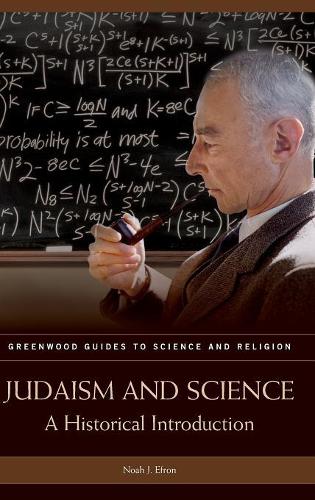
Judaism and Science: A Historical Introduction
(Hardback)
Publishing Details
Judaism and Science: A Historical Introduction
By (Author) Noah J. Efron
Bloomsbury Publishing PLC
Greenwood Press
30th November 2006
United States
Classifications
General
Non Fiction
Judaism
509
Physical Properties
Hardback
368
Description
Judaism and Science canvases three millennia of Jewish attitudes towards nature and its study. It answers many questions about the complex relationship of religion and science. How did religious attitudes and dogmas affect Jewish attitudes towards natural knowledge How was Jewish interest in science reflected, and was facilitated by, links with other cultures - Egypt and Assyria and Babylon in ancient times, Moslem culture in medieval times, and Christian culture during the Renaissance and since How did science serve as a bridge between religious communities that were otherwise estranged and embattled How did science serve as a vehicle of assimilation into the wider intellectual culture in which Jews found themselves The book considers the attitudes and work of particular Jews in different epochs. It takes an eagle's-eye view of its subject, considering broad themes from a high vantage, but also swooping down to consider particular individuals at high focus, and in detail. Judaism and Science encompasses the entire history of the interaction of Jews and natural knowledge. ; Part I: The Sages of Israel and Natural Wisdom describes the images of nature and natural philosophy in the two most important sets of books on the Jewish bookshelf: the Biblical corpus and the Talmudic/Early Rabbinic corpus ; Part II: Jews and Natural Philosophy shows how Jews explained nature, especially the nature of the heavens, or astronomy and astrology, in medieval times and early modern times. ; Part III: Jews and Science describes the entry of Jews into modern science, beginning in 19th century Europe and 20th century United States, USSR and Israel, emphasizing the social background of the rapid entry of Jews into modern sciences, and of their remarkable successes. ; The volume includes annotated primary source documents, a timeline of important events, and an bibliography of essential primary and secondary sources for further research.
Reviews
In order to understand the historical relationship between Judaism and science, says Efron it is necessary to realize that there is no such thing as Judaism and no such thing as science: both have changed so radically over the centuries that nothing definitive can be said about either except in the context of a particular time and place. This said, he looks at particulars such as the nature of the Talmud and early Rabbinic literature, Medieval Jews and natural philosophy, and Jews and science in the 20th century. * Reference & Research Book News *
This interdiscinplinary look at the intersection of Judaism and science is both a useful reference source and an interesting work to read. Academic, public, and synagogue libraries will want to consider it. * Association of Jewish Libraries Newsletter *
Author Bio
Noah J. Efron chairs the Graduate Program in Science, Technology and Society at Bar Ilan University, in Israel. He is also President of the Israeli Society for the History and Philosophy of Science. Efron has been a member of the Institute for Advanced Science in Princeton, a fellow of the Dibner Institute for History of Science and Technology at the Massachusetts Institute for Technology, and a fellow at Harvard University. He is the author of numerous scholarly essays about Jewish Natural Philosophy in early modern Europe, and his essays on the politics of religion and the politics of science have appeared in The Jerusalem Report, Midstream, Tikkun, Jewish Action, Hadassah Magazine, The World Jewish Digest, and the Boston Book Review.
